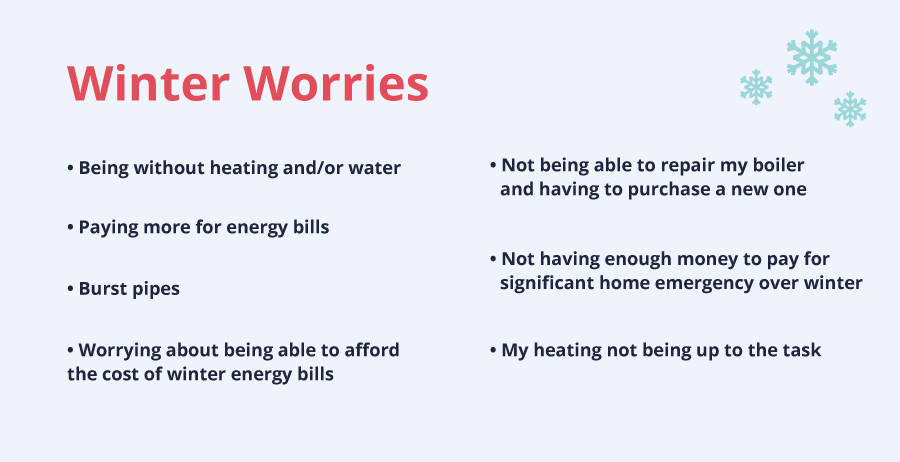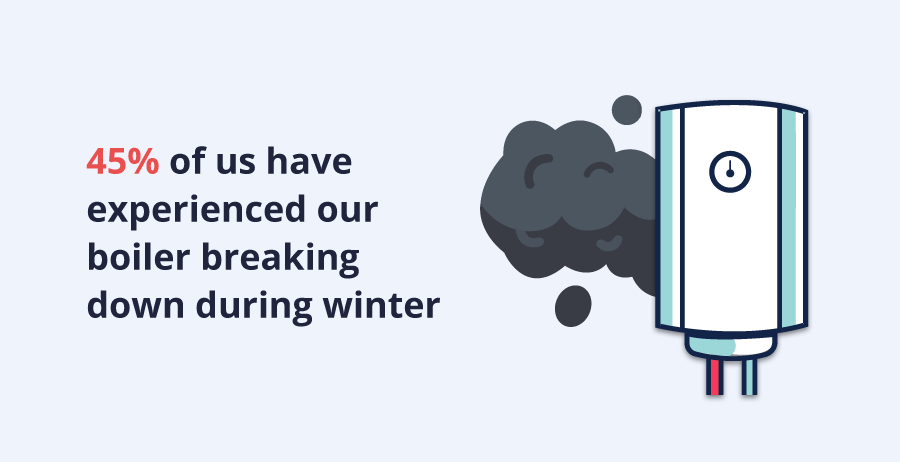Updated: 30th May, 2025

The UK is most stressed during the winter, and issues related to heating are some of the most common worries.
A study conducted by Firstbeat revealed that Brits are most stressed during November and December and least stressed during August.
Get a quote in 60 seconds, fitted as fast as next day!
0% APR finance available.
No surprise with the weather in this country!
Whilst much of this stress comes from meeting and chasing end of year deadlines, the cold, the dark and spending money on Christmas, have been found that nearly 30% of our winter worries are about our heating.
Research from Viva Manchester found exactly what makes us the most stressed during winter and compiled a list of our biggest concerns.
Being without heating and/or hot water
Paying more for energy bills
Battling winter illnesses e.g. cold and flu
Getting up when it’s dark outside
Falling on ice
Winter Blues – e.g. Seasonal Affective Disorder caused by darker days
Burst pipes
Constantly feeling cold
Worrying about being able to afford the cost of winter energy bills
Not being able to repair my boiler and having to purchase a new one
Cold hands/feet
Not having enough to pay for a significant home emergency over winter – such as replacing a boiler, burst pipes, roof repair
Getting snowed in
Putting on weight
General Christmas Day stress
Roof/gutter problems and repairs
Not having enough money saved for Christmas
The car breaking down
My heating not being up to the task of keeping my home warm
Doing less exercise
Public transport delays
Worrying my car will break down
Worrying about break-ins
Christmas party season
Spending more on health and pharmacy products – i.e. cold and flu remedies, vitamins, lip balm

Of these 25 worries, 7 of them are related to the heating of our homes. One in ten were concerned about their heating not being up to the task of keeping their homes warm, which is unsurprising as 45% of us have experienced their boiler breaking down during winter, at an average cost of £940.

However, despite the average cost of covering home emergencies being £1,278, almost half of property owners don’t have anything set aside, with a third saying they wouldn’t be able to afford a new boiler system if their current one broke down.
Being ripped off for repairs is one of the largest sources of stress for two thirds of homeowners, with one in six claiming they overpaid on emergency repairs in the past because they weren’t aware of prices.
An average of £383 per home was spent on home repairs in 2018, but almost a quarter said they wouldn’t have the money to do the same again in 2019.
If your boiler breaks down this winter, there’s no need to panic. At iHeat we provide an online service that offers a fixed boiler quote and next day installation.
Not to mention, we also offer a great range of finance plans, so no matter how unprepared you are for a broken boiler emergency, you can still afford to replace your broken boiler.
Boilers can be a daunting purchase for many people as they’re an appliance with a lot of responsibility, providing heat for you and your family is something you want to get right. Boilers aren’t exactly a quickly disposable item either, potentially lasting you a decade.
Boiler costs can be split into two segments: the first is the actual boiler itself (unit price), and the second is the cost of the boiler being installed (set up) in your property by an expert engineer.
Here at iHeat, we want to remove all of this undue stress and make the decision making process of upgrading to a new central heating system, as easy as possible.
Boiler costs can vary depending on a number of factors including their brand, model, fuel, output, warranty, labour and installation type. Typically a new boiler will cost between £1,845 and £3,500, below is a list of average boiler installations offered by iHeat (guide only).
Installation Type | Price (inc VAT) | |
Combi to combi swap | £1,845 | |
System to combi conversion | £2,499 | |
New boiler install | £2,899 | |
Back boiler to a combi | £3,299 | |
System to system | £1,945 |
We also have helpful boiler advice on our blog on topics such as how to get your boiler ready in time for winter, how to bleed a radiator and what to do if your boiler loses pressure.
For a fixed quote on a new Which? Best Boiler, fill in your homes' details here and we'll do the work for you!
Winter in the UK runs from December to February. During this period, the country experiences colder temperatures, shorter days, and increased chances of snow or frost.
Winter in the UK typically lasts for about three months, from December to February.
The UK has four distinct seasons:
Snow can fall in the UK anytime between December and March, but it’s most common in January and February. However, snowfall is less predictable and varies year by year.
Snow is most likely to fall in Scotland, particularly in the Highlands, and in northern England, such as areas like Cumbria and Northumberland. Wales and higher areas in the South West, such as Dartmoor, can also see snowfall.
The hottest month in the UK is typically July, when temperatures can rise to their peak, often in the low to mid-30°C range (86°F to 95°F) during heatwaves.
The rainiest month in the UK can vary by region, but October and November often see the highest average rainfall across the country. However, regions in the north and west tend to experience more rain year-round than the southeast.


08th October, 2025
To keep your Glow-Worm boiler working properly, it's essential to maintain the right press...
 Read Article
Read Article

08th October, 2025
A Grundfos central heating pump is an essential part of a boiler system in many UK homes....
 Read Article
Read Article

08th October, 2025
A lockshield valve is an important part of a radiator system. It helps to control the wate...
 Read Article
Read Article